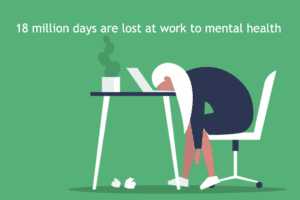18 million days per year are lost to mental health
Recent research conducted by personal injury experts at claims.co.uk has uncovered a concerning trend in the UK workforce. According to the study, an average of 18 million days per year are lost to mental health conditions, leading to a total of 146.6 million sick days annually.
The study analysed data from the Office for National Statistics’ sickness absence reports between 2018 and 2022, providing insights into demographics, common reasons for absenteeism, and strategies for staying healthy during winter commutes.
The findings reveal that minor illnesses such as coughs, colds, and flu are the primary causes of sick days, accounting for 22.5 percent of the total days lost each year. However, mental health conditions also contribute significantly, making up 12 percent of the lost working days, equivalent to 18 million days per year. This is particularly notable as January is a critical period associated with flu season and post-holiday blues, leading to increased absences.
The study also examined demographic variations in sick leave. Workers aged 50 to 64 experience the highest number of lost days, averaging 6.1 days per worker annually. In contrast, the 16 to 24 age group has a significantly lower rate of 2.7 days lost per worker each year, representing a 65.2 percent difference. Gender disparities are evident, with women reporting a 49.4 percent higher rate of sick leave compared to men, resulting in 2.6 percent of their working days lost each year.
Regional differences are also notable, with the North-East having the highest sickness absence rate, losing 5.1 days per worker annually, which represents a 48 percent increase since 2018. Wales has the highest average annual days lost per worker (5.9), while Scotland, England, and Northern Ireland have lower rates.
The study emphasises the detrimental effects of sick days on both employees and companies. Frequent absences due to illness can increase stress and workload for employees, negatively impacting job satisfaction and overall well-being. From the company’s perspective, reduced workforce attendance can lead to productivity losses and project delays.
Human resources
HR can play a crucial role in supporting employees’ health and well-being and addressing the issues highlighted by the research on sick days.
- Promote a Positive Work Environment: HR can foster a positive work culture that values employee well-being by promoting work-life balance, encouraging open communication, and providing support for mental health. This can include initiatives such as employee assistance programs, wellness programs, and flexible work arrangements.
- Mental Health Support: HR can collaborate with management to implement mental health support initiatives, such as awareness campaigns, training programs on mental health first aid, and access to confidential counselling services. They can also ensure that employees are aware of any mental health resources available, both internally and externally.
- Health and Wellness Programs: HR can develop and implement health and wellness programs that educate employees about maintaining good physical and mental health. These programs can include initiatives like wellness challenges, workshops on stress management, nutrition counselling, and access to fitness facilities or discounted gym memberships.
- Employee Engagement and Communication: HR can facilitate regular communication channels to engage and support employees. This can involve conducting employee surveys or focus groups to identify areas of concern, providing clear communication about sick leave policies and resources available, and creating platforms for employees to share feedback and suggestions for improvement.
- Training and Education: HR can organise training sessions or workshops to educate managers and employees about the importance of maintaining good health and managing stress. This can include training on recognising signs of mental health issues, promoting work-life balance, and providing guidance on effective self-care practices.
- Flexible Work Arrangements: HR can work with managers to establish flexible work arrangements, such as remote work options, flexible schedules, or job-sharing. These arrangements can help employees better manage their health needs and reduce the impact of commuting or workplace stressors.
- Return-to-Work Support: HR can provide support to employees returning to work after a prolonged illness or mental health absence. This can involve creating a structured return-to-work plan, providing accommodations if needed, and ensuring a supportive and inclusive environment during the transition.
- Monitor and Analyse Absence Data: HR can analyse sick leave and absence data to identify trends and patterns, allowing them to understand the root causes of absenteeism and develop targeted strategies to address them. This data analysis can help HR identify potential areas for improvement and implement proactive measures to reduce sick leave.
Overall, HR can proactively address the concerns raised by the research by creating a supportive work environment, implementing policies and programs that promote physical and mental well-being, and providing resources and support to employees facing health challenges.
